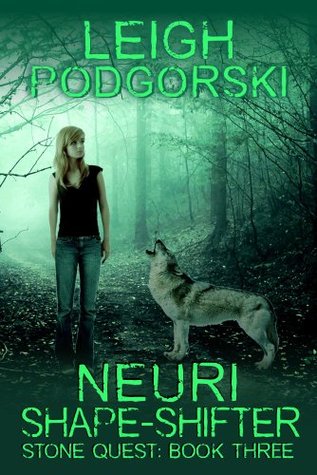Adding to the tumult is the case of three missing girls vanished from the Lower East Side of Manhattan where Luke lived as the disciple of the black magician Armand Jacobi. Luke's investigation takes him to the raging Vampire Club scene where ominous signs point irrefutably to Jacobi's involvement.
Then, BG vanishes, leaving behind only a cryptic note.
Luke's world is further shattered by the sudden appearance of a beautiful older woman-- Danuta Dabrowitz, his mother, bringing with her the memories and painful secrets of his childhood.
Luke's investigation grows more gruesome, and more deadly-- turning up the skeletal remains of Matthew, the boy whose murder twenty-five years ago has haunted Luke all his life. Working closely with retired NYPD Detective Stan Banor and his men, and with retired Sheriff Esther Rinaldi, Luke is no longer working a missing persons case, but a homicide.
Then Danuta tells him of their heritage to an ancient people, the Neuri, who possess enormous powers, including the power of shape-shifting-- a power that Armand Jacobi himself may share. In battle against his arch-enemy once again, surrounded with warriors he is not sure he can trust, including himself, Luke Stone follows the trail from New Camen, NH, to Alphabet City, NY, to the Leelanau Peninsula of Michigan, in the race of his lifetime to save his daughter's life.
Goodreads Description
Leigh Podgorski is a member of the Magic Realism Facebook group I administer and one of the bloggers involved in the Magic Realism bloghop. In the two years of the Facebook Group I have watched as Leigh wrestled with whether she wrote magic realism or not. When I saw Neuri Shape-shifter go free on Amazon I downloaded it to see what I thought.
The first thing I thought was this is a rollicking good read. Leigh certainly knows how to structure a story to keep the reader turning the pages. Do I detect some of her theatre background here? She uses dramatic irony to such good effect - allowing the reader to see inside the mind not only of Luke and his daughter, but also the antagonist Armand. These shifts of point of view increase the tension for the reader, who can see the impending trap. The POV changes are really clear - the voices are so individual and well-drawn. One suggestion - Bridget's journal entries are formatted in italic, which I thought unnecessary, especially as blocks of italics are hard to read.
The second thought was that I don't envy Leigh's job of classifying this book. When she started the Stone Quest series Leigh described it as magic realism, but in her contribution to this year's bloghop she has changed her mind - http://leighpod.wordpress.com/2014/07/31/is-it-or-isnt-it-magic-realism-and-does-it-matter/
This book could be put in so many categories. Paranormal came first to mind - spirits, black magic and satanism all appear in its pages. I see that Leigh did label it 'paranormal' for a while but gave up doing so. The trouble with that moniker is that what generally passes for paranormal (and what the typical reader wants) doesn't really allow for the depth of the psychology or the spiritual nature of the book.
So what about magic realism? This really got me thinking. My instinct is that it is not magic realism. But why? This question is something that is a constant source of debate on the Facebook Group and in the bloghop posts. Yes the book is set in contemporary USA and yes it features magic, so why not? For me the magic was too upfront, too all embracing for magic realism. But then what about The Master and Margarita? In that book we have not just a satanist but the devil himself wreaking magical havoc on Moscow. It is the nature of magic realism to make us question both reality and magic. Leigh's book didn't have me questioning reality. And Bulgakov's classic does that. Moreover the actions of Woland and his servants are directed at the realists who will not accept magic or faith as real. If pushed I suppose I would say that it is dark fantasy perhaps, in the way that I would say Neil Gaiman's novels are. Amazon lists it as "horror - occult". I have to say that I never read horror, unless it is also magic realism, and even then have problems with it.
The third thing was how detailed the characterization was. Armand's attitude to Luke is ambiguous - moving from hurt to pride to vengeance in a matter of sentences. There is a strong Jungian influence here and not just in the superficial Hollywood Hero's Journey way. Luke and Armand aren't opposites so much as mirrors. They have much in common. I was struck that all three main characters were gifted with magic, including the antagonist. The magic/realist clash is not reflected in the characters' relationships. And yet one might say the clash is internalized in the central character. In this book Luke is confronting not only his nemesis Armand but also the Shadow in himself: the possibility that he too has murdered.
What to do with a series of books with strong focus on character development is a problem I have experienced myself. A major story arc across the books is the main character's self realization. Then in each book there is also the battle with Armand. I read this book without having read the first two in the Stone Quest series and I think that was a mistake. Leigh does an excellent job in setting up the book so that you can read it as a standalone, but there is so much to set up that I felt somewhat overwhelmed. I needed the slower build up that the other two books would have provided. That is because my interest is in the character development rather than the will he/won't he storyline which this book has in buckets.

No comments:
Post a Comment